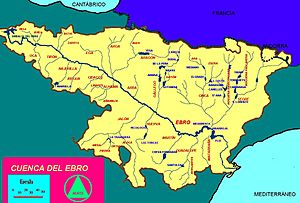Ebro Treaty facts for kids
The Ebro Treaty was an important agreement signed in 226 BC between Hasdrubal the Fair of Carthage and the powerful Roman Republic. This treaty set the Ebro River in Iberia (modern-day Spain) as a clear border.
The main rule was simple: Carthage agreed not to expand its control north of the Ebro River. In return, Rome promised not to expand south of the river. This was meant to keep peace between the two great powers.
Contents
Why was the Ebro Treaty important?
This treaty was a big deal because it tried to prevent conflicts between Rome and Carthage. Both sides were growing stronger and expanding their territories. The Ebro River acted as a natural dividing line.
What happened after the treaty?
Some time after the treaty was signed, Rome made friends with a town called Saguntum. This town was located south of the Ebro River, which was supposed to be Carthage's area.
The Carthaginian general Hannibal was looking for a reason to start a war with Rome. He saw Rome's friendship with Saguntum as a chance.
The Siege of Saguntum
Hannibal decided to attack Saguntum. This led to a long, tough fight known as the Siege of Saguntum, which lasted for eight months.
Rome quickly sent messengers to Hannibal and the Carthaginian leaders. They demanded that Carthage hand over Hannibal because he had attacked a Roman ally. However, Carthage refused, saying that the people of Saguntum had started the conflict.
Rome could not help Saguntum in time, and the town fell to Hannibal in 219 BC.
How did the treaty lead to war?
After Saguntum fell, Rome got ready for war. They sent another group of messengers to Carthage. These messengers again demanded that Carthage hand over Hannibal and anyone else responsible for the attack.
The Romans knew that war was likely. They just wanted to follow the official steps before declaring it.
Carthage's refusal and war
The Carthaginian leaders then said they no longer accepted the Ebro Treaty. They refused to hand Hannibal over to the Romans.
They argued that the Roman people themselves had once refused to accept a treaty made by their generals because it wasn't officially approved by everyone. The Carthaginians tried to use this old example to say the Ebro Treaty wasn't valid.
The Roman messengers did not accept this argument. In 218 BC, war was officially declared. This conflict became known as the Second Punic War. It was a long and difficult war that lasted until 201 BC.
See also
 In Spanish: Tratado del Ebro para niños
In Spanish: Tratado del Ebro para niños
- List of treaties
- Casus belli (a reason for war)
 | James Van Der Zee |
 | Alma Thomas |
 | Ellis Wilson |
 | Margaret Taylor-Burroughs |


